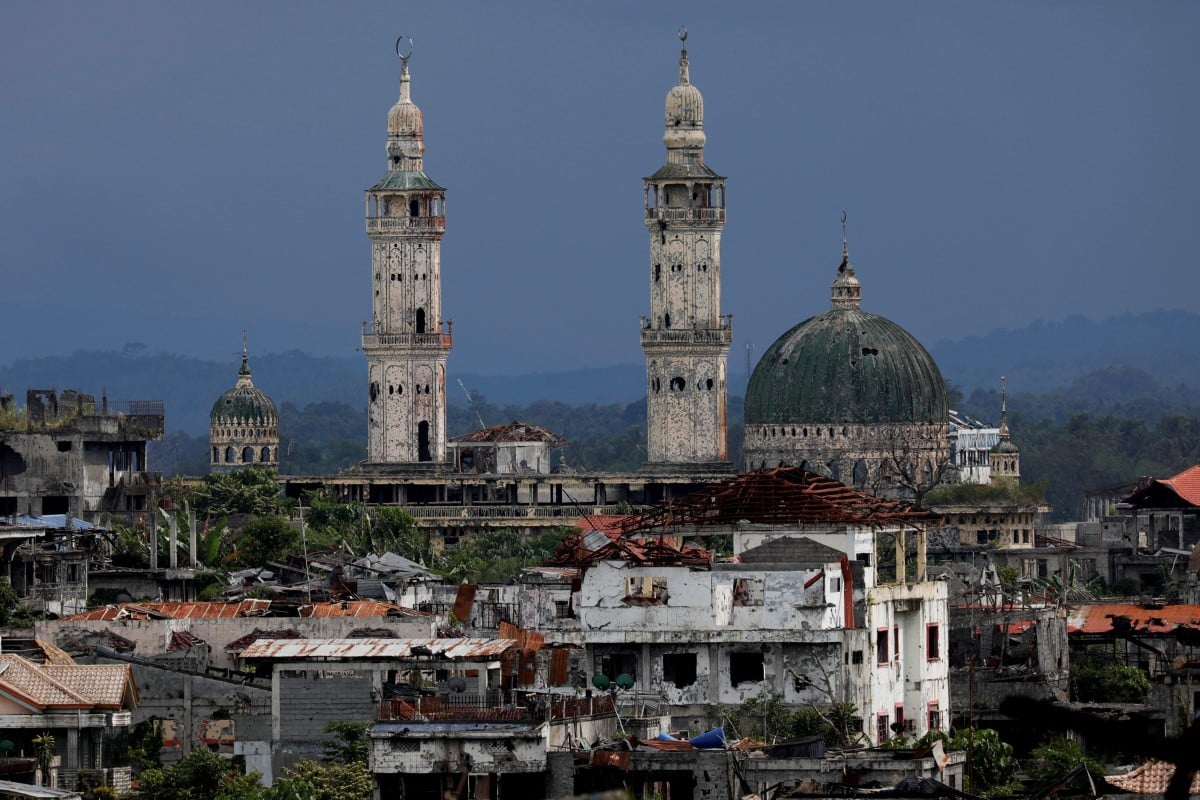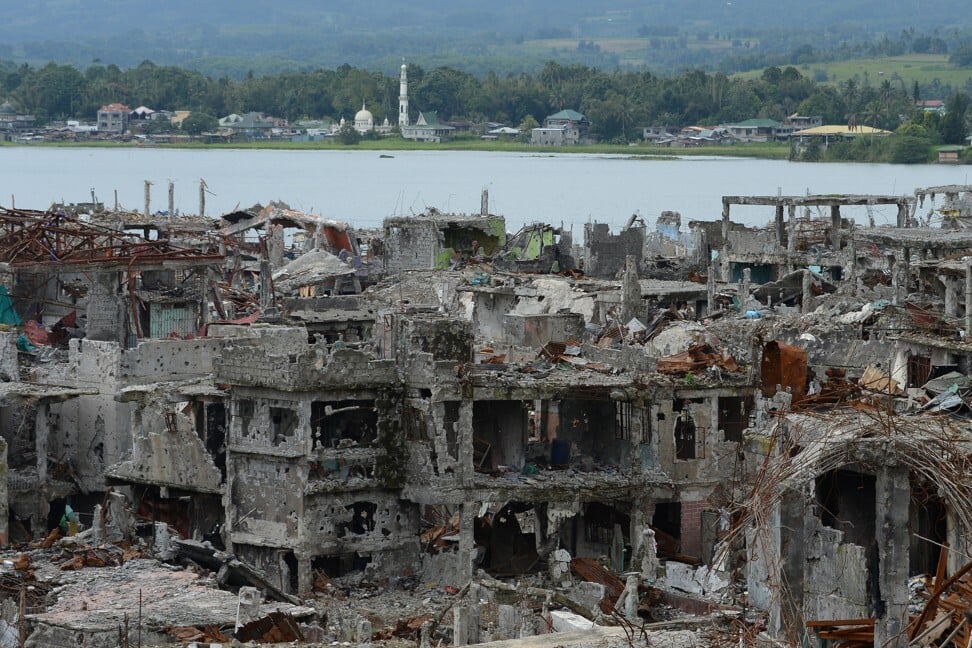- Minhati Madrais’ late husband was Omar Maute of the pro-Isis Maute Group, which in May 2017 laid siege to Marawi in Mindanao
- The Indonesian widow is believed to have many contacts in the region, and her release may revive the Maute Group’s finances, according to a terror expert

Dilapidated buildings seen in war-torn areas of Marawi City. File photo: Reuters
The widow of a slain pro-Islamic State (Isis) Filipino leader, Omar Maute, whose group seized control of Marawi city in southern Philippines in 2017, has been freed from prison.
The widow of a slain pro-Islamic State (Isis) Filipino leader, Omar Maute, whose group seized control of Marawi city in southern Philippines in 2017, has been freed from prison.
Indonesian Minhati Madrais, 39, was married to Omar Khayyam Maute of the pro-Isis Maute Group, which he led together with his brother Abdullah Maute.
Remnants of the Maute Group are believed to be waiting for her release from jail, as she holds the key to their financing.

The Maute Group seized control of Marawi city in May 2017 and laid siege to it for five months. File photo: SCMP / Chieu Luu
“Minhati was freed very recently and she is currently in Iligan city. She is expected to return to
“Minhati was freed very recently and she is currently in Iligan city. She is expected to return to
Indonesia sometime this month,” a senior Indonesian security source said.
Iligan city is in Mindanao island, southern Philippines.
Details of her release is unclear. The security source said Indonesia was informed by a court in Iligan that she is “free to return home”.
Minhati was arrested in November 2017 in Iligan city and charged with illegal possession of explosives.
During the raid on her home, police said they recovered four blasting caps, two detonating cords, and a time fuse. Minhati denied ownership of the explosive components.
Iligan city is in Mindanao island, southern Philippines.
Details of her release is unclear. The security source said Indonesia was informed by a court in Iligan that she is “free to return home”.
Minhati was arrested in November 2017 in Iligan city and charged with illegal possession of explosives.
During the raid on her home, police said they recovered four blasting caps, two detonating cords, and a time fuse. Minhati denied ownership of the explosive components.
A court in Iligan “could not find” strong evidence of Minhati providing logistical support for the Maute Group and “released her on June 30”, according to Siti Darojatul Aliah, executive director of Society Against Radicalism and Violent Extremism (Serve), which works to deradicalise former terror convicts.
Minhati’s status in Indonesia has yet to be ascertained when she returns, whether she will be free.
“We have programmes for our citizens who join militants in foreign countries. When they are deported [back to Indonesia], we will analyse whether we can apply our laws on them,” said the Indonesian security source.
“The point is, she cannot be freed just like that,” said the source, adding that authorities will also look into whether she has ties with pro-Isis groups in Indonesia.
She will undergo a “deradicalisation programme”, said the source.
Her recent release may revive the terror funding efforts of the Maute Group in MindanaoProfessor Mimi Fabe, Philippine National Police College
The Maute Group, together with the pro-Isis faction of the notorious Indonesian Abu Sayyaf Group, seized control of Marawi city in May 2017 and laid siege to it for five months before the Philippine military regained control.
Minhati’s status in Indonesia has yet to be ascertained when she returns, whether she will be free.
“We have programmes for our citizens who join militants in foreign countries. When they are deported [back to Indonesia], we will analyse whether we can apply our laws on them,” said the Indonesian security source.
“The point is, she cannot be freed just like that,” said the source, adding that authorities will also look into whether she has ties with pro-Isis groups in Indonesia.
She will undergo a “deradicalisation programme”, said the source.
Her recent release may revive the terror funding efforts of the Maute Group in MindanaoProfessor Mimi Fabe, Philippine National Police College
The Maute Group, together with the pro-Isis faction of the notorious Indonesian Abu Sayyaf Group, seized control of Marawi city in May 2017 and laid siege to it for five months before the Philippine military regained control.
The attack marked the most serious bid by Isis to gain a foothold in Southeast Asia, unsettling governments across the region with its ferocity, impeccable planning and abundant logistics.
The battle of Marawi killed more than 1,100 civilians, militants and security forces. At least 1,780 people, who were taken hostage by the militants, were rescued.
Foreign fighters from Indonesia and Malaysia and as far afield as India, Saudi Arabia, Morocco and Chechnya took part in the fighting.
Minhati met and married her husband Omar Maute when they were both students in Cairo, Egypt. They have six children. Her Indonesian father is a prominent cleric who runs a religious boarding school in Bekasi, West Java.
Minhati allegedly handled the funding for the Maute Group, and previously fixed procurement of weapons, personnel and training camps, said Mimi Fabe, a professor of financial terrorism and transnational organised crime at the Philippine National Police College.
Minhati allegedly also handled the logistics during the Marawi siege, said the terrorism financing expert.
“Her recent release may revive the terror funding efforts of the Maute Group in Mindanao. They rely on her for her contacts in the region and in the Middle East … and she has direct links to Isis central,” Fabe said.
“I expect her to resume playing this role,” said Fabe, adding that Minhati stopped her activities while in prison.
The Maute Group had an estimated 200 million pesos (US$4 million) before waging the Marawi Siege. “I believe they have more resources [now] since they raided a bank and houses during the siege,” Fabe said.

Bombed-out buildings inside of what was the main battle area between government troops and Isis-inspired militants in Marawi. File photo: AFP
In Marawi city, many local residents are known to keep their cash in their homes as they do not trust depositing them in banks.
According to Fabe, the bank in Marawi held an estimated 500 million pesos (US$10 million) in cash deposits before the raid.
Police believe Minhati had cash and cryptocurrencies which she hid prior to her arrest, Fabe said. “She can access that through a mobile phone or laptop,” she said.
According to Fabe, the bank in Marawi held an estimated 500 million pesos (US$10 million) in cash deposits before the raid.
Police believe Minhati had cash and cryptocurrencies which she hid prior to her arrest, Fabe said. “She can access that through a mobile phone or laptop,” she said.
According to Fabe, the remaining members of the Maute Group number some 200 men. Fewer than 50 of them are foreign fighters, including some from Syria. The members are scattered all over Mindanao island.
While the militants still have “the capacity to take a city” and launch bomb attacks, they are not expected to do so as there are army camps located inside cities, Fabe said.
They are more likely to “target a smaller area, such as a municipality” as most of them are located far from army camps, Fabe said.
The Maute Group is now part of a group led by Ker Mimbantas, also known as Commander Zacaria, according to Rommel Banlaoi, chairman of the Philippine Institute for Peace, Violence and Terrorism Research.
“The Maute Group will no longer be revived. The group has evolved into Daulah Islamiya Zacaria Group,” Banlaoi said.
Mimbantas was a member of the Maute Group and has about 40 armed followers who used to work with the Maute brothers, operating mostly in Lanao del Sur province and its provincial capital Marawi city, Banlaoi said.
Three years after the Marawi siege, terror threats in Philippines have turned “dreadful”, with suicide terrorism becoming the most favoured tool of attack by pro-Isis groups, Banlaoi said.
From July 2018 to November 2019, there were four major suicide bombings on Mindanao involving foreigners.
“Four major groups are still operating in Mindanao on behalf of Isis. These groups claim to be part of Islamic State in East Asia,” he said.
Banlaoi added terrorist groups were using the current coronavirus pandemic as a window of opportunity to recruit members, intensify propaganda activities especially in depressed rural areas heavily affected by lockdowns, and mount violent attacks.
In Indonesia, the Maute Group’s network in the country are mostly from Jamaah Anshar Khilafah Islamiyyah (JAKI), which sent fighters to Marawi, said Sofyan Tsauri, a former senior member of al-Qaeda of Southeast Asia.
Many of JAKI’s men are former members of Jemaah Islamiah, al-Qaeda’s Southeast Asia branch, who do not have a track record of terror activities, Sofyan said.
https://www.scmp.com/week-asia/people/article/3093161/omar-mautes-widow-thought-control-millions-cash-and-cryptocurrency

No comments:
Post a Comment
Note: Only a member of this blog may post a comment.